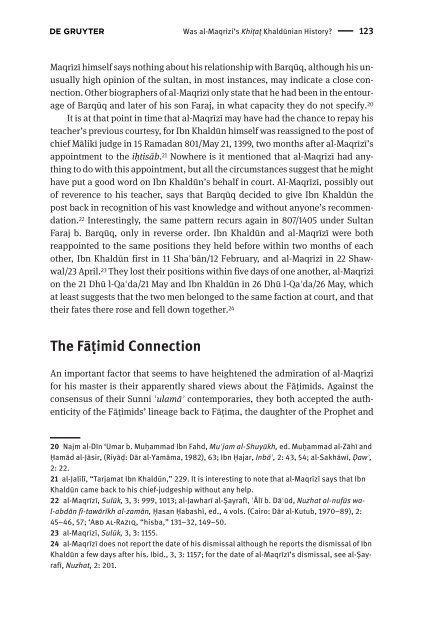0021-1818_islam_98-1-2-i-259
0021-1818_islam_98-1-2-i-259
0021-1818_islam_98-1-2-i-259
You also want an ePaper? Increase the reach of your titles
YUMPU automatically turns print PDFs into web optimized ePapers that Google loves.
Was al-Maqrizi’s Khitat Khaldunian History? 123<br />
Maqr\z\ himself says nothing about his relationship with Barquq, although his unusually<br />
high opinion of the sultan, in most instances, may indicate a close connection.<br />
Other biographers of al-Maqr\z\ only state that he had been in the entourage<br />
of Barquq and later of his son Faraj, in what capacity they do not specify. 20<br />
It is at that point in time that al-Maqr\z\ may have had the chance to repay his<br />
teacher’s previous courtesy, for Ibn Khaldun himself was reassigned to the post of<br />
chief Malik\ judge in 15 Ramadan 801/May 21, 1399, two months after al-Maqr\z\’s<br />
appointment to the ihtisab. 21 Nowhere is it mentioned that al-Maqr\z\ had anything<br />
to do with this appointment, but all the circumstances suggest that he might<br />
have put a good word on Ibn Khaldun’s behalf in court. Al-Maqr\z\, possibly out<br />
of reverence to his teacher, says that Barquq decided to give Ibn Khaldun the<br />
post back in recognition of his vast knowledge and without anyone’s recommendation.<br />
22 Interestingly, the same pattern recurs again in 807/1405 under Sultan<br />
Faraj b. Barquq, only in reverse order. Ibn Khaldun and al-Maqr\z\ were both<br />
reappointed to the same positions they held before within two months of each<br />
other, Ibn Khaldun first in 11 Sha^ban/12 February, and al-Maqr\z\ in 22 Shawwal/23<br />
April. 23 They lost their positions within five days of one another, al-Maqr\z\<br />
on the 21 Dhu l-Qa^da/21 May and Ibn Khaldun in 26 Dhu l-Qa^da/26 May, which<br />
at least suggests that the two men belonged to the same faction at court, and that<br />
their fates there rose and fell down together. 24<br />
The Fa5imid Connection<br />
An important factor that seems to have heightened the admiration of al-Maqr\z\<br />
for his master is their apparently shared views about the Fatimids. Against the<br />
consensus of their Sunni ^ulama# contemporaries, they both accepted the authenticity<br />
of the Fatimids’ lineage back to Fatima, the daughter of the Prophet and<br />
20 Najm al-D\n ‘Umar b. Mu1ammad Ibn Fahd, Mu^jam al-Shuyukh, ed. Mu1ammad al-Zah\ and<br />
0amad al-Jasir, (Riyad: Dar al-Yamama, 1<strong>98</strong>2), 63; Ibn 0ajar, Inba#, 2: 43, 54; al-Sakhaw\, Daw#,<br />
2: 22.<br />
21 al-Jal\l\, “Tarjamat Ibn Khaldun,” 229. It is interesting to note that al-Maqr\z\ says that Ibn<br />
Khaldun came back to his chief-judgeship without any help.<br />
22 al-Maqr\z\, Suluk, 3, 3: 999, 1013; al-Jawhar\ al-Sayraf\, ^Al\ b. Da^ud, Nuzhat al-nufus wal-abdan<br />
fi-tawarikh al-zaman, 0asan 0abash\, ed., 4 vols. (Cairo: Dar al-Kutub, 1970–89), 2:<br />
45–46, 57; ‘Abd al-Raziq, “hisba,” 131–32, 149–50.<br />
23 al-Maqr\z\, Suluk, 3, 3: 1155.<br />
24 al-Maqr\z\ does not report the date of his dismissal although he reports the dismissal of Ibn<br />
Khaldun a few days after his. Ibid., 3, 3: 1157; for the date of al-Maqr\z\’s dismissal, see al-Sayraf\,<br />
Nuzhat, 2: 201.


